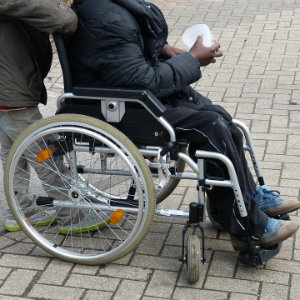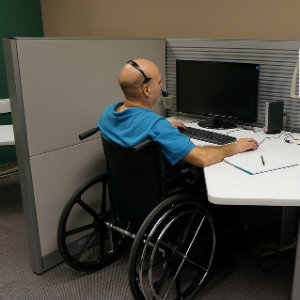Are you feeling confused about filing for Social Security benefits? You may be looking for help regarding:
- How to determine if you're eligible for SSD or SSI
- How to file a claim
- What to expect from the appeals process
- How to find a Social Security lawyer
At Monheit Law, we know how to help disabled workers get the help they need.

Our experienced injury lawyers can help you apply for and receive the benefits you need.
If you've recently suffered a disabling injury and are unable to work, you may be curious about what disability benefits are available to people in your situation. Many injured workers are unaware of the benefits they qualify for until they find themselves needing them.
Many injured workers are unaware of the benefits they qualify for until they find themselves needing them.
When you're disabled, applying for benefits on your own can be intimidating for some and downright impossible for others. Many disabled people do not have the physical and/or mental capabilities to provide the necessary documents or to meet the requirements of the Social Security Administration on their own.
Additionally, only 28% of Social Security Disability claims are accepted on the first attempt, which means these workers must go through a lengthy appeals process to receive their benefits.
At Monheit Law, our dedicated Social Security benefits lawyers have spent countless hours helping our clients receive payments when they're unable to work due to a disability. Over the years, we've developed a strong feeling for the concerns people have when a serious injury or illness is preventing them from earning a paycheck.
This is why having a disability lawyer on your side can make a huge difference. Below you will find a list of some of the most common concerns our clients bring up during consultations. Our answers will provide you with a basic baseline of what to expect from the system. However, it's important to remember that each disability case is unique.
FREE CONSULTATION
Pennsylvania SSD & SSI FAQs
- Am I Eligible For Social Security Disability?
- Who Is Eligible For Supplementary Security Income?
- What's The Difference Between SSD & SSI?
- How Do I Apply For SSD Or SSI Benefits?
- When Should I File For Benefits?
- What Types Of Injuries Qualify For Social Security Benefits?
- Can You Receive SSD For Mental Health Problems?
- Can I Receive Benefits If I'm Working?
- Can I Receive SSD If I'm Receiving Benefits For Workers' Comp?
- What Are Some Common Reasons For Denied Claims?
- What Should I Do If My Claim Is Denied?
- How Much Money Can I Expect To Receive?
- How Are Payment Amounts Calculated?
- Will I Need A Lawyer To Help Me Receive Benefits?
- How Much Does A Lawyer Cost?
Am I Eligible For Social Security Disability?
In order to qualify for SSD benefits, you must meet two general criteria:
- Have an injury or illness which could prevent you from working for at least 1 year
- You must have worked in a job covered by Social Security for 5 of the past 10 years
You must also prove that your injury or illness is disabling enough to prevent you from working by providing adequate medical evidence.
Who Is Eligible For Supplementary Security Income?
If you do not qualify for SSD because you haven't worked in a qualifying job in the past 10 years, you should look into applying for Supplemental Security Income (SSI). These benefits are available for disabled and elderly people who have insufficient income and less than $2,000 in assets (or less than $3,000 for married couples).
You must prove that your disability has prevented you from engaging in any type of meaningful work. If you are unable to return to your previous line of work but you are capable of performing other types of work, you may not qualify for these benefits.
What's The Difference Between SSD & SSI?
SSD is intended for workers who have been severely injured or contracted a serious illness which prevents them from working for a year or longer. In order to qualify, you must have accumulated enough work credits by working in a job covered by SSD.
SSI is meant for low-income people who either have no work history or have not accumulated enough work credits to qualify for SSD. These benefits are solely based on need, and are intended to help provide basic human needs such as food, shelter, and clothing.
How Do I Apply For SSD Or SSI Benefits?
There are three options available for filing a Social Security claim:
- Apply over the phone
- Apply in-person at a Social Security office
- Apply online
You should make sure to gather all relevant info before applying, including the date of your disability onset and records for medical treatment. If you're unsure if you have everything you need for a claim, consider asking for guidance from a knowledgeable lawyer.
When Should I File For Benefits?
It's important to file for benefits as soon as you become disabled. For SSD claims, there is a six-month waiting period from the date the Social Security Administration establishes as the beginning of your disability. While out of work and seeking the financial help you need, every day counts.
For SSI, you will begin receiving payments during the first full month after you filed your claim.
What Types Of Injuries Qualify For Social Security Benefits?
The Social Security Administration has an injury listing manual known as the blue book. This book has a listing of physical injuries and mental illnesses which are automatically eligible for either SSD or SSI benefits. In order to qualify, your specific injury must also meet specified guidelines listed in the book.
You aren't always required to meet the blue book guidelines. You may also receive coverage if:
- Your condition may be considered medically equivalent to a listing, or
- Your condition is determined to limit your functioning to the extent that you can no longer work
When determining if your injuries qualify, it's necessary to receive both medical and legal guidance from experienced professionals.
Can You Receive SSD For Mental Health Problems?
Yes, there are 11 categories of mental disorders listed in the official blue book.
- Neurocognitive - A decline in mental functioning. Symptoms include problems with memory, speech, visual-spatial functioning, and more
- Schizophrenic spectrum and other psychotic disorders - Examples include schizophrenia, schizoaffective disorder, delusional disorder, and psychotic disorder due to other medical conditions.
- Depressive, bipolar, and related disorders - Disorders in this category cause irritability, depressed or elevated moods, or a loss of interest in activities both work-related and recreational. In order to qualify, symptoms must be severe enough to cause a decline in cognitive functioning.
- Intellectual disorder - This category includes developmental disorders and intellectual disabilities which prevent someone from holding a job.
- Anxiety and obsessive-compulsive - Examples include social anxiety disorder, panic disorder, generalized anxiety disorder, agoraphobia, and obsessive-compulsive disorder.
- Somatic symptom and related disorders - Examples include somatic symptom disorder, illness anxiety disorder, and conversion disorder.
- Personality and impulse-control - Examples include paranoid, schizoid, schizotypal, borderline, avoidant, dependent, obsessive-compulsive personality disorders, and intermittent explosive disorder.
- Autism spectrum - This category is separate from intellectual disorders, and includes autism spectrum disorders with or without intellectual and language impairments.
- Neurodevelopmental - Examples include learning disorders, borderline intellectual functioning, and Tourette syndrome.
- Eating disorders - E.g. anorexia, bulimia, binge-eating, avoidant/restrictive food disorder.
- Trauma and stress-related - E.g. post-traumatic stress disorder (PTSD)
In addition to meeting the criteria, you must also establish that you have been receiving regular treatment for your disorder.
Can I Receive Benefits If I'm Working?
It is possible to receive these benefits if you're working, but there is a limit for monthly earned income. As of 2017, this amount is capped at $1,170 per month (and at $1,920 for the blind).
However, you're provided with a nine-month trial work period where you will still receive benefits while you work, even if you exceed the monthly income limit. This is in place to allow disabled workers to slowly work their way back into the workforce and ensure that they're capable of returning. After the trial period, you may still receive SSD benefits if you fall below the monthly limit. But in months over $1,170, you will not receive benefits.
Can I Receive SSD If I'm Receiving Benefits For Workers' Comp?
Yes, but your SSD payments will be reduced. The total amount of your benefits must not exceed 80% of your average earnings at the time you became disabled. For example, if you made $5,000 per month, you would only be permitted to collect a total of $4,000 in public benefits while you're out of work.
What Are Some Common Reasons For Denied Claims?
According to the Social Security administration, 72% of claims are denied at the initial level. Common reasons for denied Social Security Disability claims include:
- Nonmedical reasons - Such as a failure to provide full medical reports and listings of your doctors or missing an appointment with the Social Security Administration.
- Medical reasons - Such as your injury not lasting over 1 year or not limiting your function enough to prevent you from working.
What Should I Do If My Claim Is Denied?
You should file an appeal as soon you possibly can. There is a 60-day deadline, but it's best to act as soon as you receive the letter. The majority of Social Security benefits are awarded during the appeals phase, so don't get too discouraged if your initial claim is denied.
While you're permitted to go through the appeals process on your own, it's often necessary to have an experienced disability lawyer to represent you. This process can be confusing, but a knowledgeable lawyer will help you to gather all of the evidence you need for success.
How Much Money Can I Expect To Receive?
Disability payments vary depending on the amount of income you've earned while paying Social Security taxes. The Social Security Administration calculates your payments using a complex formula. Benefits are capped at $2,687.
Will I Need A Lawyer To Help Me Receive Benefits?
You're permitted to apply for Social Security benefits on your own, but you are statistically more likely to win your case if you have experienced legal counsel to guide you through the process. These cases are complex and require a great deal of evidence, paperwork, and preparation for hearings.
Your lawyer can help you with the following aspects of SSD and SSI claims:
- Help you prove that your injuries meet blue book requirements
- Collect and submit medical evidence
- Help you fill out paperwork completely and accurately
- File paperwork by set deadlines
- Get an official medical opinion from your doctor
- Prepare you for what to expect in the hearing
- Help you give useful testimony when on the stand
- Cross-examine medical experts and other witnesses
As you can imagine, attempting to handle all of these duties on your own is overwhelming for most people suffering from disabilities.
How Much Does A Lawyer Cost?
At Monheit Law, we realize that if you're filing for SSD or SSI, you may not have money upfront for a lawyer. That's why we only require payment from you if we help you to win your case. There is a federal law which regulates the maximum fee a disability lawyer can charge, which is the lesser of either 25% of your disability backpay or $6,000.
We also offer free consultations, so you can meet us and discuss all of the details of your case before making a commitment.
Monheit Law Montgomery County Office 215-866-2018
Directions to our Montgomery County Injury Law Office
4V4Q+FM Jenkintown, Pennsylvania
Open 24 hours
Social security attorney Jenkintown
Civil law attorney
Employment attorney
Law firm
Attorney
Social security attorney
Monheit Law South Philly Office 215-302-0095
Directions to our South Philly Injury Law Office
WRCH+CP Philadelphia, Pennsylvania
Open 24 hours
Social security attorney South Philly
Civil law attorney
Employment attorney
Law firm
Attorney
Social security attorney
